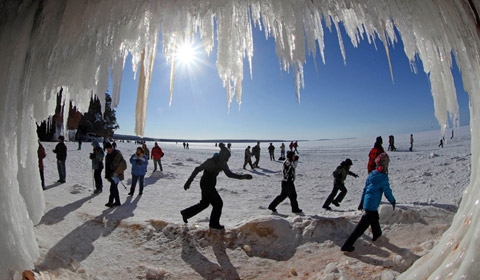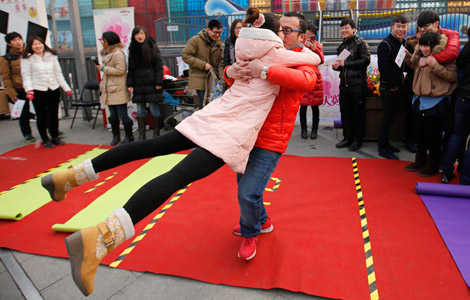A question of taste: What do Chinese want to drink?
Updated: 2014-02-17 14:42
By Mike Peters (China Daily USA)
|
||||||||
Everyone wants to sell wine to China, says Grape Wall of China blogger Jim Boyce. "But they spend little effort to find out what Chinese people want."
So Boyce conducts a wine tasting in Beijing every year, offering a changing panel of Chinese consumers (and a couple of cabernet-swilling journalists, including myself) a chance to blind-taste about 20 low-priced wines available in the consumer market here.
This year he took the challenge up a notch. "Lots of hotels and restaurants have been asking me to recommend a good Chinese wine for their list," he says. So this year he mustered 21 bottles - all Chinese wines made from Chinese grapes. Then he gathered his tasters in a private room at Temple Restaurant Beijing, and let the swirling, sniffing, sipping and spitting begin.
The goals were simple: find the best ones, make people comfortable and have fun. Tasters simply scored each wine "love it", "like it", "dislike it" or "hate it".
The first 16 wines were all retail-priced at 150 yuan ($25) or less, Boyce says, though some are not easy to find. The last five were premium vintages he collected for comparison, which would cost between 199 yuan and 790 yuan per bottle.
Professor Ma Huiqin of China Agricultural University, who has taught wine appreciation for over a decade, chatted up the judges as we sampled two flights of white wines, two flights of reds and then the mixed flight of pricier wines.
"Part of the group prefers red over white," she says, "and feels reds are more complex and more enjoyable than white. Several people mentioned 'safe choices'. This means that consumers require predictability, even with the small wineries (which Boyce focused on - no Great Wall or Dragon Seal on the table). This is more challenging for small wineries than big ones. Fruitiness and complexity are preferred."
The professor also noted that sweetness in aroma is appreciated: "That is why several people like the Hansen Riesling-Semillon." That vintage smells like a harvest wine but is dry, Boyce notes. Personally, I thought the nose was divine but the taste had me reaching for the spittoon. (Full disclosure: I had a slight head cold, so my sensory perceptions were a bit off all night.)
You can check out the scores and comments bottle by bottle on Grapewallofchina.com, me highlights:
Of the 16 wines priced at 150 yuan or less, only four got more "dislike/hate" votes than "love/likes".
The most likes/loves went to Grace Chardonnay with 11 votes (11 likes). The runners-up, with 10 votes each, were Grace "Premium" Chardonnay (four loves, six likes) and Helan Mountain "Premium" Cabernet Sauvignon (one love, nine likes).
The number of quality wines from China impressed the tasters. "The Chinese were proud of these Chinese wines and said they could buy the ones they 'love'," Ma says, "even though they might be more expensive and less intense than imported ones."
The consumers on the panel almost all said they enjoyed the first flight of whites better than the comparably priced first flight of reds - even though reds command the lion's share of the market in China. Looking at the scores, Boyce notes: "There was a much bigger range between top and bottom for the white wines, with consumers finding the white wines easier to distinguish and the red wines more homogenous."
Boyce also points out that in the final flight, the pricier wines, almost every judge liked or loved both of the chardonnays on offer, though they were very different. "Out of 13 votes, oaky Grace Tasya's Reserve received five 'loves' and seven 'likes', while fruitier Helan Mountain Special Reserve received five 'loves' and eight 'likes'.
"This shouldn't be a shocker," Boyce says on his blog, "but the point is often lost because it is far easier to generalize about a billion-plus people and seek a single solution - or a single kind of wine - than to deal with the complexity of the China market."
What did I learn, besides not to drink a lot of wine with a head cold?
That Hansen, Helan Mountain and Silver Heights are Chinese labels that now deserve to be mentioned in the same breath with Grace. That Ningxia may be the place I want to retire. And that Great River Hill winery in Shandong, home of Chateau Nine Peaks Cabernet Sauvignon 2011, is bucking the conventional wisdom that says China's best wines are now rooted in the western regions.
mikepeters@chinadaily.com.cn
|
Chinese participants at the wine tasting, organized by Grape Wall of China blogger Jim Boyce in Beijing, sample a variety of Chinese wines. Mike Peters / China Daily |
(China Daily USA 02/17/2014 page8)

 World's largest freshwater lake frozen
World's largest freshwater lake frozen
 American photographer wins World Press Photo 2013
American photographer wins World Press Photo 2013
 Zhou Yang retains women's 1500m title
Zhou Yang retains women's 1500m title
 Renzi set to become Italy's youngest PM
Renzi set to become Italy's youngest PM
 Kissing contest celebrates Valentine's Day in Beijing
Kissing contest celebrates Valentine's Day in Beijing
 Xinjiang quake damage could have been worse
Xinjiang quake damage could have been worse
 US East Coast buried in snow
US East Coast buried in snow
 China's Li wins women's 500m gold
China's Li wins women's 500m gold
Most Viewed
Editor's Picks

|

|

|

|

|

|
Today's Top News
Dallas shooting kills one, injures six
Venezuela expels 3 US diplomats
High-rise security tightened after stunt
Shelters reveal flaws in child welfare
Precipitation expected to clear up smog-filled skies
Police reveal details of Xinjiang terrorist attack
Canadian immigration changes 'unfair'
Finding real wealth in health industry
US Weekly

|

|





